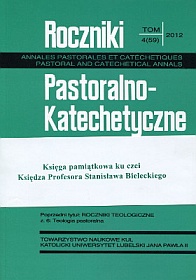The Principles of the Church's Participation in the Development of the World
Abstract
The Church's involvement in the development of the world cannot be accidental and occasional, but has to be based on principles, adherence to which will allow avoiding numerous problems that arise at the meeting point of the Church and the world. The article discusses four principles the Church has to be guided by when participating in the development of the world: the principle of being faithful to its own mission, the principle of the just autonomy of worldly things, the principle of dialogue, and the principle of the good of the human person.
The first principle reminds one about the main goal of the Church, whose mission may not be limited to earthly duties. The second one deals with the proper autonomy that is due to the earthly reality, and that is not tantamount to the independence of the Creator. The third principle – the one of dialogue – can be considered, on the one hand, a sign of the Church’s being open to the world, and on the other, its basic relation with the world. And finally, the fourth principle points to the good of man, who should always be the main value in the development of the world.
References
Fiałkowski M.: Stosunek Kościoła do świata. W: Teologia pastoralna. Red. R. Kamiński. T. 1. Teologia pastoralna fundamentalna. Lublin: Wyd. Atla 2 2000 s. 249-292.
Fiałkowski M.: Świat kultury, polityki i gospodarki a wyzwania nowej ewangelizacji. W: Ewangelizacja odpowiedzią Kościoła w Polsce na wyzwania współczesności. Red. W.Przygoda, E. Robek. Sandomierz: Wyd. Diecezjalne i Drukarnia w Sandomierzu 2011 s.207-226.
Gocko J.: Kościół obecny w świecie – posłany do świata. Teologiczno-społeczne aspekty posłannictwa Kościoła w świecie po Soborze Watykańskim II. Lublin: Wyd. KUL 2003.
Syczik Z.: Podstawowe powinności człowieka wobec świata materialnego. W świetle posoborowego nauczania moralnego i literatury teologiczno-moralnej. Kraków: Wyd. WT PAT 2006.
Szafrański A. L.: Kairologia. Zarys nauki o Kościele w świecie współczesnym. Lublin: Wyd. TN KUL 1990.

